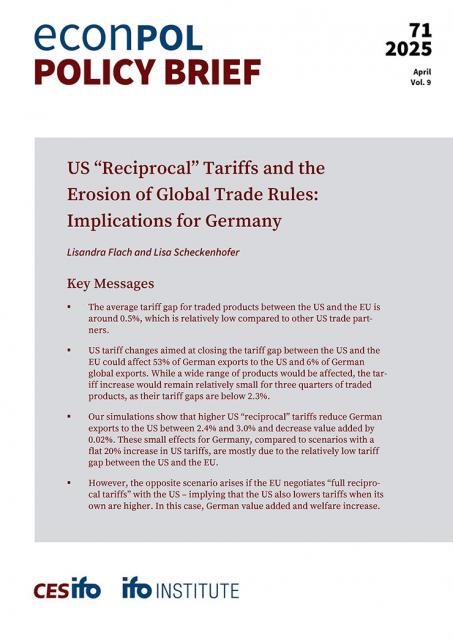News Archive

60%, -4% And 6%, a Tale of Thresholds for EU Fiscal and Current Account Developments
|
Working Paper
| News
- Read more about 60%, -4% And 6%, a Tale of Thresholds for EU Fiscal and Current Account Developments
This paper investigates the relationship between the budget balance and the current account balance for European Union countries with a quarterly data set from 1995 to 2020, using various time series and panel data empirical methodologies. The analysis shows that the impact of the budget balance on the current account balance is greater for those Eurozone countries with an average current account balance-to-GDP ratio outside the range of -4 to 6%, and in Eurozone countries with debt-to-GDP ratios above 60%.

Conference Videos Now Available
|
EconPol Annual Conference
| News
Videos of our annual conference 2021 are now available to view on our conference website. Videos include the opening keynote speech from Olivier Blanchard, Senior Fellow at the Peterson Institute for International Economics, the keynote speech from Daniel Gros, Distinguished Fellow at the Centre for European Policy Studies, and our panel discussion on Fiscal Policy for the Post-Covid Era - US vs EU with Clemens Fuest, Claudia Sahm, Debora Revoltella and Maarten Verwey.

The Dangers of High Public Debt in an Uncertain World: Post-Covid-19 Dangers for Public Finance
|
Policy Brief
| News
In this EconPol Policy Brief Daniel Gros cautions countries with high debt ratios not to simply rely on low interest rates to make their (Covid-19) debt sustainable. Now that the health emergency is subsiding, governments have to chart a new course for public finance. The starting point is a higher level of public debt. However, high debt ratios represent a danger, even when interest rates are low.

Daniel Gros: “Policymakers Should Consider High Public Debt Ratios as a Risk”
|
EconPol Annual Conference
| News
Daniel Gros, Distinguished Fellow at the Centre for European Policy Studies, will speak about the dangers of high public debt in his afternoon keynote speech at the EconPol Annual conference. He cautions countries with high debt ratios not to rely on low interest rates to make their (Covid-19) debt sustainable. His speech is based on a most recent EconPol Policy Brief that will be released on the day of the conference.

All for One and One for Green Energy: Community Renewable Investments in Europe
|
Policy Brief
| News
Community renewable energy (CRE) projects are gaining momentum in Europe and could play a significant role in reaching the EU’s accelerated decarbonisation goals. This is a key message that can be derived from this EconPol Policy Brief. Based on a survey across 31 European countries the authors find a high interest in community renewable investments, especially in countries where this model is not yet very common. However, the design of the project matters. The study finds that certain attributes lead to higher incentives for citizen investment.
